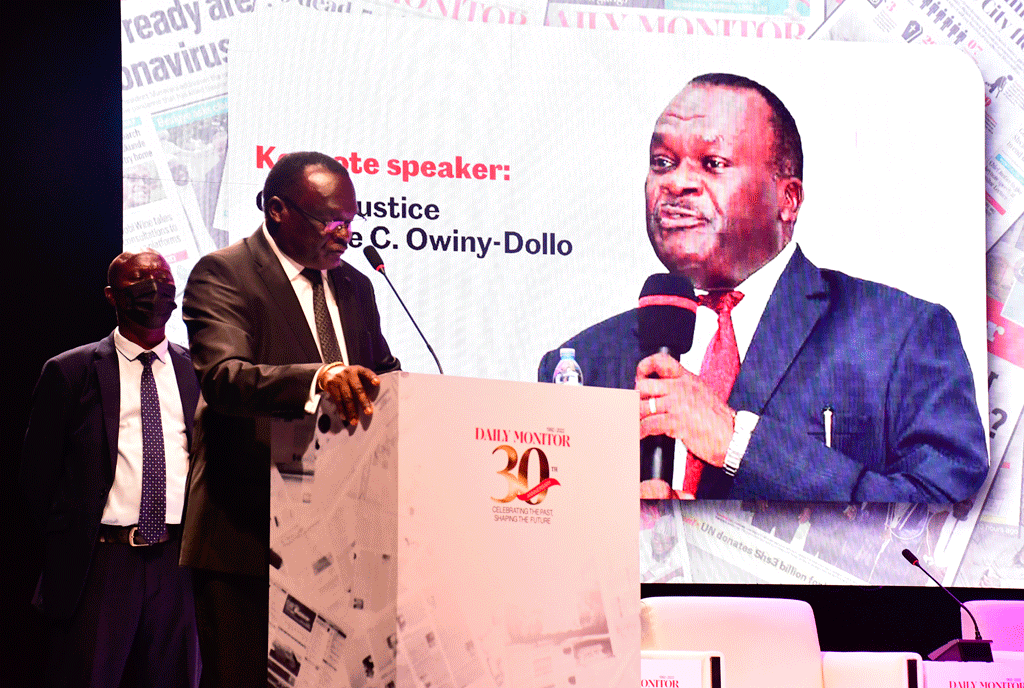Prime
Judiciary to set up more regional Court of Appeal circuits

Chief Justice Alfonse Owiny-Dollo
What you need to know:
- The Chief Justice was speaking on August 21 as he officiated at the launch of the video conference system at Gulu High Circuit in Gulu City. He said the new system will modernise the courts and enhance service delivery.
The Judiciary is set to open up new High Court and Court of Appeal circuits in different parts of the country following the appointment of new judicial officers, Chief Justice Alphonse Owiny-Dollo has revealed.
According to the Chief Justice, they will begin with two Court of Appeal circuits in Mbarara and Gulu before they establish more High Court circuits in Moyo (West Nile), Kitgum (Acholi), Apac (Lango), Kumi (Teso), Bugiri and (Busoga).
“Following the appointment and swearing-in of new judges, we now have the capacity and will soon operationalise the new circuits in the country,” he said.
“Once the law has been amended and I can get additional justices, then we should be able to operationalise the others,” he added.
The Chief Justice was speaking on August 21 as he officiated at the launch of the video conference system at Gulu High Circuit in Gulu City. He said the new system will modernise the courts and enhance service delivery.
“We cannot afford to remain where we were as Judiciary 20 years ago, that would be suicide. By adopting ICT in our system, it facilitates effective online service delivery. These tools and facilities will greatly promote the observance of human rights,” he said.
The Chief Justice also said the video conference system and the new court circuits across the country will boost the Judiciary’s ability to dispose of more than 150,000 pending cases.
Currently, from the Supreme Court to the Magistrate Grade One courts across the country, there are a total of 156,349 pending cases.
Of these, 42,960 are backlog, meaning that they have not been tried or disposed of for the past two years.
At the ceremony, Gulu Chief Resident Judge Philip Odoki said establishment of the video conferencing system will save time and resources.
“The security of inmates in some of these problematic cases now will be no more and there will be no overcrowding of people in some of those sensitive cases. We hope that in the future, similar equipment be installed in the magistrate’s courts,” Justice Odoki added.
However, Mr James Ereemye Mawanda, the registrar-in-charge of Magistrates’ Affairs and Data Management, said the system is likely to be frustrated by poor Internet.
“Whereas NITA-U is in Gulu and other places where we have made these installations, connecting individual users is still a problem and I hope that we can be able to quickly deal with that,” he said.
Mr Milton Tiyo, the director of Correctional Services at Uganda Prisons Services, urged the Judiciary to ensure timely release of acquittal documents and installation of Internet for effective use of the video conference system.
About the system
Mr David Kikabi, the Judiciary head of ICT, explained that the system has been installed at five regional High Court circuits of Gulu, Mbale, Mbarara, Jinja and Masaka.
He explained that for the system to work, three giant screens and high-definition cameras are installed in the courtroom, and the same set of systems is installed at the prison inside the facility where the suspect will appear.




